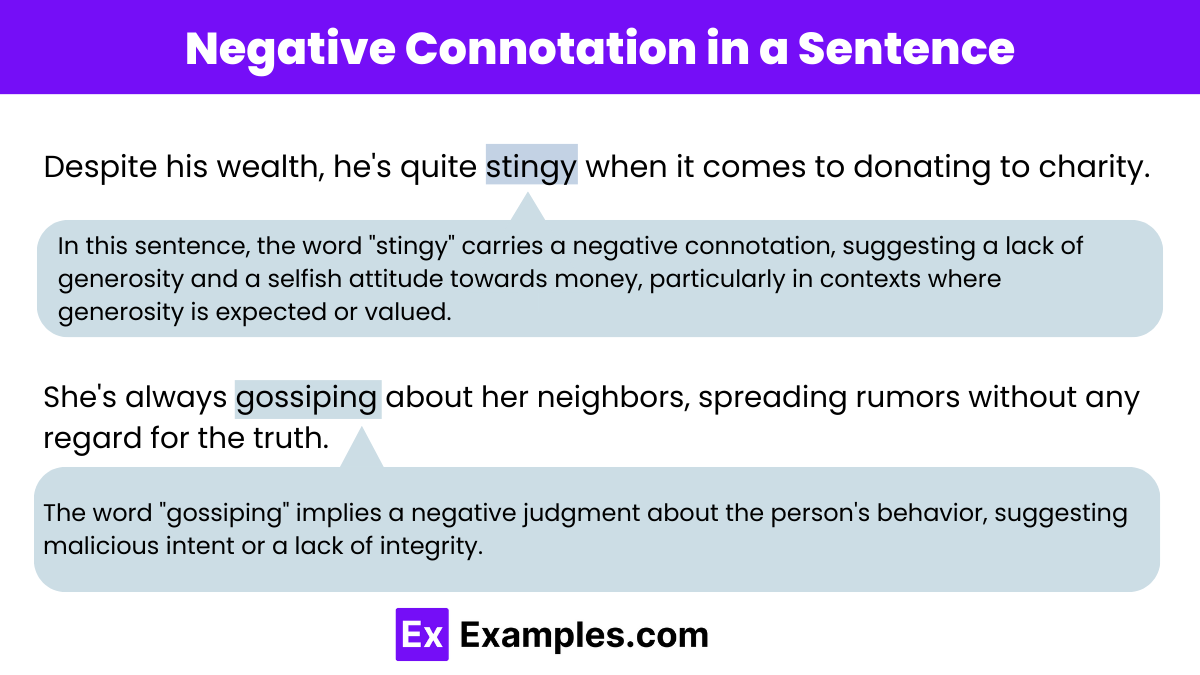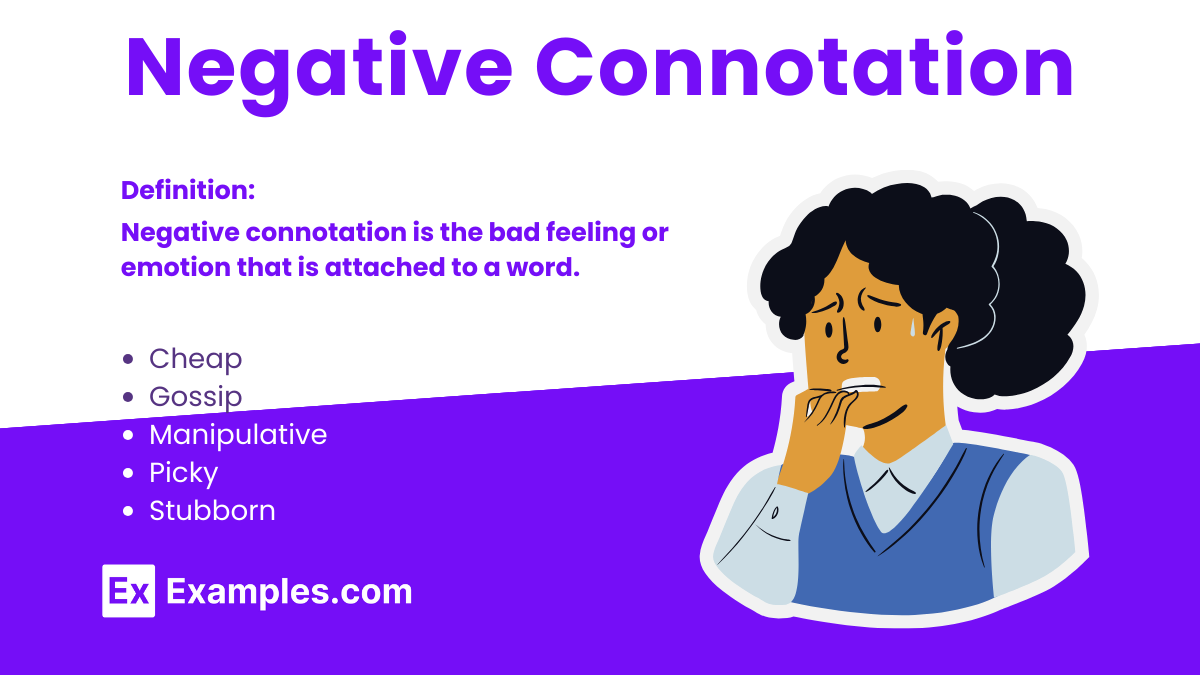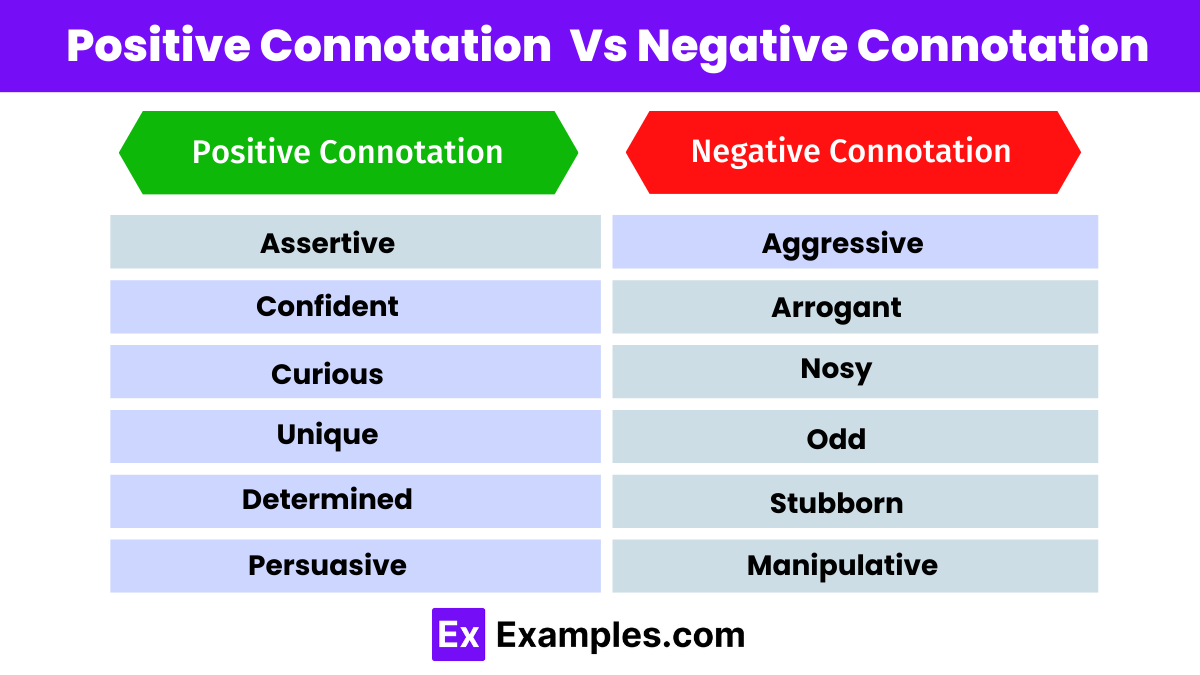30+ Negative Connotation Examples
Words have its literal meaning when you look up in the dictionary. But how about when we use those same words to associate feelings and emotions? Is there a dictionary for that? Don’t bank on it. The association of feelings and emotions to words are called connotations. There are two types of connotations: positive and negative connotations. When you hear a word that gives you negative vibe, negative connotations are used. We will be discussing more on that in this article.
Negative connotations can be used to your advantage but at the same time, it can also something you should avoid– it all boils down to the purpose. Take for example having an online shop. You cannot sell if you are describing your products with negativity and distaste. Using negative connotations, in that case, wouldn’t be helpful. But what if you are writing a story that centers on fear or dread? Negative connotation is the only way that can effectively execute your story.
What is Negative Connotation? – Definition
Negative connotation refers to the unfavorable, negative, or unpleasant association that a word or phrase invokes in addition to its literal meaning. “Negative connotation is the bad feeling or emotion that is attached to a word.” This subjective aspect can significantly influence perceptions and attitudes, leading to a more negative interpretation or response from the audience. Words with negative connotations are often utilized to evoke emotional responses or to subtly express disapproval or criticism without resorting to overtly negative language. For instance, the word “stubborn” carries a negative connotation compared to the more neutral or positive “determined,” despite both suggesting a strong will.
What is the Difference Between Positive and Negative Connotations
There are two types of connotations which are positive connotations and negative connotations. You may also see Positive and Negative Connotations.
Even if it is difficult for some people, it is rather easy to tell the difference between positive and negative connotations. It’s only a matter of listening to the words and understanding the feelings it tries to communicate. For example, you are to make a sentence about an outfit. How would you analyze it in a more criticizing manner? Would you scrutinize the outfit? Or would you study the outfit? If you are to “study” the outfit, it would have a positive connotation because it leans more towards analyzing rather than criticizing. Whereas using the word “scrutinizing”, it exudes a negative impression and leans more towards criticizing rather than analyzing. You may also see Connotation and Denotation Examples.
Negative Connotations in a Sentence

- “She’s always gossiping about her neighbors, spreading rumors without any regard for the truth.”
- The word “gossiping” implies a negative judgment about the person’s behavior, suggesting malicious intent or a lack of integrity.
- “The manager’s decisions are often seen as manipulative, aiming to control employees rather than leading them.”
- “Manipulative” suggests deceitful or underhanded tactics, casting the manager’s actions in a negative light.
- “His constant nitpicking over minor details can be incredibly frustrating for his team.”
- “Nitpicking” conveys a negative view of someone’s behavior, implying they’re overly critical and difficult to please.
- “Despite his experience, he comes across as arrogant, believing he knows better than everyone else.”
- “Arrogant” carries a negative connotation, suggesting an excessive and unappealing pride or self-importance.
- “The old-fashioned policies at that company make it difficult for innovative ideas to be appreciated.”
- “Old-fashioned” is used negatively here, suggesting that the policies are outdated and hinder progress, as opposed to “traditional,” which might carry a more neutral or positive connotation.
Examples of Negative Connotations and its Positive Counterpart
Negative Connotation: The office is filled with boxes that are crammed with documents.
Positive Connotation phrase counterpart: a box filled with documents
Negative Connotation: The fashion model scrutinized my outfit when I passed in front of her.
Positive Connotation phrase counterpart: studying someone’s outfit
Negative Connotation: The company couldn’t earned a profit from past 2years.
Positive Connotation phrase counterpart: the company earned a profit
Negative Connotation: I become a stingy person every time my siblings would ask me to accompany them to the mall.
Positive Connotation phrase counterpart: an accommodating person
Negative Connotation: You do not belong here in our clique.
Positive Connotation word counterpart: group
Negative Connotation: The students argued with their teacher about the results of the inter-school competition.
Positive Connotation word counterpart: debate
Negative Connotation: He keeps on forcing me to go to the after party.
Positive Connotation word counterpart: convince
Negative Connotation: She felt depressed after watching a romantic drama on the television.
Positive Connotation word counterpart: sentimental
Negative Connotation: The new manager has this air of arrogance all over him.
Positive Connotation word counterpart: confidence
Negative Connotation: My father said that it was already impossible to fix a second hand, beat-up pickup truck.
Positive Connotation word counterpart: fixable
Negative Connotation: I prefer buying low-quality items when going to the grocery.
Positive Connotation word counterpart: economical
Negative Connotation: Lauren’s handwriting is scrawny like her body.
Positive Connotation word counterpart: thin or lean
Negative Connotation: My neighbors are so noisy in their conversations.
Positive Connotation word counterpart: lively
Negative Connotation: Her children are so hyperactive that they disturbed the entire ceremony.
Positive Connotation word counterpart: energetic
Negative Connotation: The stench of my brother’s poor cooking skills wafted across the house.
Positive Connotation word counterpart: aroma
Negative Connotation: Her obsession with chocolates is getting out of hand.
Positive Connotation word counterpart: avocation
Negative Connotation: The kidnappers hid her in a cabin near the woods.
Positive Connotation word counterpart: hotel
Negative Connotation: My foolhardy brother goes against my parents’ wishes for him to become a pilot.
Positive Connotation word counterpart: courageous
Negative Connotation: My favorite dirty diner place is just two blocks away from the office.
Positive Negative Connotation word counterpart: café or bistro
Negative Connotation: The tree huggers are protesting against the president about global warming.
Positive Connotation word counterpart: environmentalists
Negative Connotation: My sneaky seatmate copied my answers during the exam.
Positive Connotation word counterpart: opportunistic
Negative Connotation: The new university president is bossy.
Positive Connotation word counterpart: confident
Negative Connotation: She won the award because she was aggressive during the competition.
Positive Connotation word counterpart: assertive
Negative Connotation: I ordered him to turn off the air conditioner because it was already getting too cold.
Positive Connotation word counterpart: chilly
Negative Connotation: I thought she was going for a dull look during her wedding.
Positive Connotation word counterpart: natural
Negative Connotation: The sly cat jumped from one table to another.
Positive Connotation word counterpart: clever
Negative Connotation: The baby cackled creepily at 3 in the morning.
Positive Connotation word counterpart: giggled
Negative Connotation: The president’s snob wife arrived at the venue of the press conference.
Positive Connotation word counterpart: friendly
Negative Connotation: The vigilantes chased after me when I increased my speed beyond the required speed limit.
Positive Connotation word counterpart: police officers
Negative Connotation: The model looks so skinny in that she was the perfect choice to represent the fashion show.
Positive Connotation word counterpart: slender
Negative Connotation: The corrupt politicians gathered in the session hall earlier than expected.
Positive Connotation word counterpart: statesmen
Negative Connotation: A creepy looking man smirked at me when I passed in front of the store.
Positive Connotation word counterpart: smiled
Examples of Negative Connotations in Literature
William Shakespeare’s The Merchant
ANTONIO: Hie thee, gentle Jew.
The Hebrew will turn Christian: he grows kind.
This is a negative connotation towards the Jews.
William Shakespeare’s Romeo and Juliet
JULIET: What’s Montague? it is nor hand, nor foot, Nor arm, nor face, nor any other part Belonging to a man. O! be some other name: What’s in a name? That which we call a rose By any other name would smell as sweet.
Juliet Capulet says a negative connotation because it reminds her of the family feud between the Capulets and Montagues, although she has no ill-feelings towards her lover Romeo Montague.
Eternal Sunshine of the Spotless Mind (2004)
Clementine: I apply my personality into paste.
Joel: Oh, I doubt that very much.
Clementine: Well, you don’t know me so… you don’t know, do you?
Joel: Sorry, I was… just trying to be nice.
Clementine: Yeah… I got it…
Clementine: … I’m Clementine, by the way.
Joel: I’m Joel.
Clementine: Hi, Joel.
Clementine: No jokes about my name… Nooo, you wouldn’t do that. You were trying to be nice.
Joel: I don’t know any jokes about your name.
The word nice has a negative connotation according to Clementine. To her, nice means dull, plain, and ordinary.
To conclude, it is best if you use negative connotations with caution. You might not know the words you say are already affecting the people but you are having conversations with.
Negative Connotation in Communication
Negative connotation in communication refers to the use of words that carry unfavorable or undesirable implications, which can significantly alter the message’s perceived tone and intention. When a word with a negative connotation is used, it can introduce bias, evoke negative emotions, or even lead to misunderstandings between the sender and receiver. For instance, describing someone as “stubborn” rather than “determined” can shift the listener’s perception from admiring persistence to viewing the person as unreasonably inflexible. In professional settings, this can affect teamwork and morale, while in personal interactions, it may strain relationships. Understanding the impact of negative connotations is essential for effective, empathetic, and respectful communication, as it enables individuals to convey their thoughts more accurately and considerately, minimizing the risk of inadvertently offending or alienating the audience.
FAQs
Is Overweight a Negative Connotation?
Yes, “overweight” often carries a negative connotation, implying health issues or lack of fitness. It suggests a judgmental view of someone’s body weight, which can be demeaning or hurtful, as opposed to more neutral terms like “above a healthy weight.”
Why Is Scrawny a Negative Connotation?
“Scrawny” has a negative connotation because it describes someone as excessively thin in a way that implies weakness or lack of strength. It suggests an unattractive level of thinness, rather than using more neutral or positive terms like “slender.”
Does Strange Have a Negative Connotation?
“Strange” can have a negative connotation, implying something is odd or abnormal in an unsettling or unfavorable way. It often suggests a deviation from the norm that is not positively received, unlike more neutral terms like “unusual.”
What Is a Word That Means Negative Connotation?
A word that encapsulates the concept of negative connotation is “pejorative.” Pejorative terms are used to express disapproval or to disparage someone or something, carrying a clearly negative implication.
What Implies a Negative Connotation?
A word implies a negative connotation when it evokes negative feelings or associations beyond its literal meaning. This can subtly influence the listener’s or reader’s perception, leading to a more critical or disapproving interpretation.
What Is the Negative Connotation of Skinny?
The negative connotation of “skinny” implies an unhealthy or unattractive level of thinness, often suggesting frailty or weakness. It focuses on a lack rather than a neutral or positive physical state, unlike “slim” or “fit.”
Does Skinny Have a Negative Connotation?
Yes, “skinny” often has a negative connotation, emphasizing an extreme or undesirable level of thinness. It can suggest poor health or attractiveness, making it a less favorable description than more neutral terms like “slender.”



